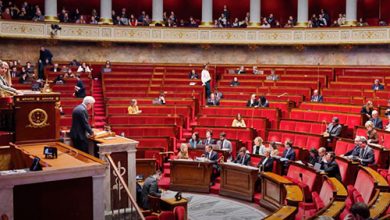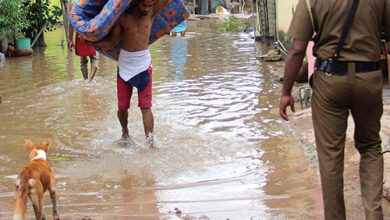STATE OF THE NATION


DO FAIR STAND THE WINDS OF FREEDOM?
Wijith DeChickera sets his vision on the far pavilions of a nobler liberty and demands action as the bastions of national integrity are being breached
As the republic rings in another Independence Day, we would do well to count the cost of our freedom. In the mists of time over seven decades ago, our liberty from repressive power was won by default – the heavy toll of war among other international economic realities necessitating that European crowns cast off their tropical colonies.
Over two years ago, a similar liberty bell was rung by a bloodless coup that helped free our citizenry from an oppressive power among other sociopolitical and cultural shackles. Yet in both cases – liberty for a republic to coalesce from over four centuries of exploitative rule and freedom from a suppressive regime for a new nation-state to aspire to achieve – a sense of anticlimax prevails.
In the global arena, despite almost casually shrugging off the bondage of our commercial-minded colonisers, Sri Lanka as a country has failed to leverage its liberty to discern, discover and define its true place in the sun.
Instead, decades of apathy, internecine war of diverse kinds and weak political will have left our leaders and a lackadaisical economy at the mercy of neo-colonising forces like world banks, international monetary funds and the so-called Western powers.
On the domestic front, although the polity offered the powers that wanted to be a golden opportunity on a plate through supposed revolution, our ambitions and aspirations remain largely unrealised.
IRONY The ironies of what has been called ‘regime normalisation’ by academics cannot have gone unnoticed by the incumbent administration itself. While salutary reforms such as the 19th Amendment to the Constitution exist on paper, independent commissions continue to function – if at all they do – and their recommendations are taken seriously or rejected at the apparent behest of the head of state, challenging the goodwill and independence of the respective commissioners.
While significant changes like the catalysing of a new social contract through proposed constitutional reforms appears to gather steam, the objective observer may be forgiven for suspecting that it could all come to a head under the sole will and pleasure of an executive prime minister who is himself no more a democratic today than demagogues of old.
Each man kills the thing he loves. Every machine evolves into a better avatar of itself by adapting the properties of its predecessors. If the movement to rid modern Sri Lanka of authoritarian anti-democratic incarnations of government isn’t more careful, it runs a serious risk of becoming the very regime it replaced.
It bodes ill for business, civil society and the state of the nation that a large swathe of the country’s stakeholders remains ignorant of and/or apathetic to the serious plight that the present direction of democratic governance portends.
INEVITABILITY The same pundits who prognosticated the stagnation of Project Sri Lanka have perhaps cynically suggested that there is a certain inevitability to this turn of events. They have cited similar phenomena in other Asian economies where liberating sociopolitical forces eventually degenerate into a lacklustre version of the very evil they intended critiquing and transforming.
These cases in point – Myanmar among others – make it seem almost inevitable that our island-nation will head in the same downward direction. It appears from ‘everything’ that ‘everyone’ is saying that the writing is on the wall. It seems to be saying, as a particularly Ceylonese idiom has it, that ‘coming colours no good…’
Be that as it may, this is not the first time that our doughty islanders as a demographic have been confronted by the challenges posed by their rulers to the benefit of the Commonwealth. In pre-colonial Ceylon, even though independence was won by default, there was more than a bloodless coup to account for the statesmanship and skilful diplomacy that won our island its spurs as a free state.
In post-war Sri Lanka, even though under a brutal pre-war regime, the heads that were bloody but unbowed belonged to the people and not their elected representatives. There were more than the designs of a few democrats to account for the regime change and all the attendant opportunity, promise and potential.
INDESTRUCTIBILITY A common factor in Ceylon’s independence from colonialism’s conquests, and the emergence from war’s ravages and its victors’ vicissitudes, was the sovereignty of the people.
Amorphous, mercurial and indefinable, it nevertheless serves as the fuel for democracy’s no longer (if ever) sacred flame. Ambition to live
a quiet life of peace with justice for all and prosperity for more than those in power – who clutch their perks and privileges as if they were rare seasonal fruit – must be made of sterner stuff.
Anything less than the mindful, wholehearted engagement of a cross section of Sri Lankans must result in loss, disaster and a return to the dark ages… for the Hun is at the Gate.
Business chambers and SMEs alike can lead a charge to challenge poor governance and demand a clearer vision. They must speak up at political fora now, and not simply consult with bureaucratic mandarins in plush confabs to secure their own future and its assured security.
Civil society lacks the beef… Could biz lend a hand?






Over the years since independence, I believe the political predicament of the country has been getting worse, giving rise to a plethora of issues such as corruption, nepotism, self-aggrandizement, embezzlement and unbridled megalomania in many forms and manifestations. The political will is abominably weak despite so much lip service being paid to the contrary.
From those at the highest echelons of power to the small fry, everyone seems to be taking a fatalistic stance towards where the nation is heading for and just shrugging it off. I don’t think I should include here, my own favourite expletive, even though I know it explains all of this much better.
As the political leadership of the country keeps putting their self-interests ahead of the nation, the situation continues to deteriorate. But, few seem to be aware of the fact destruction or abuse of the nation’s resources for personal short-term gains hurts all people in the long-run and that the poorest will be hit the hardest.
We certainly need politicians today who can look over the rim of their tea cup and can take in the big picture without feeling overwhelmed, and start addressing the nation’s political plight right from the grassroots. I’m not optimistic about the fact that I will be able to witness this phenomenon happening in my lifetime, as someone whose 50 years is before him and not behind. And I certainly can’t help lamenting about it.